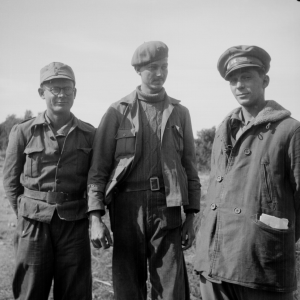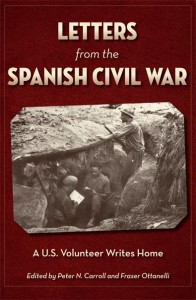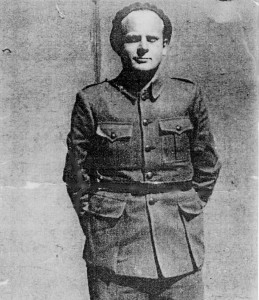Kent State publishes Carl Geiser letters from Spain
Carl Geiser, political commissar of the Lincoln Battalion, prisoner of war held in Spain until 1939, and author of Prisoners of the Good Fight, left the letters he wrote to his family to the ALBA collection. The complete letters, edited by Peter N. Carroll and Fraser Ottanelli, have just published by Kent State University Press in Ohio, Geiser’s home state. The Volunteer is proud to present an extract from the introduction, along with one of Geiser’s letters.
“Probably you are a bit surprised to hear I am in Spain fighting with the army of the Spanish Republic,” Carl Geiser wrote to his brother Bennet nine days after he crossed the border into Spain on May 1, 1937. “And so I suppose you want to know why I am here.”
Born in a small town in rural Ohio, Carl Geiser came from a deeply religious German-speaking family that had recently emigrated from Switzerland. The family was hardworking, frugal, churchgoing, and politically conservative and, while they had little formal schooling, held education in high regard. Carl excelled in his studies and, in 1928, he left home to attend college in Cleveland. With the onset of the Great Depression, the collapse of the job market and the erosion of student funds, Carl, along with thousands of college students across the country, began to question the logic and value of capitalism. This awakening led him to embrace radical politics and eventually to join the Communist Party.
For Geiser the decision to take up arms against Fascism in Spain was the product of a world view which combined with internationalist ideals of class- based solidarity in the struggle against American small-town communal values exploitation, oppression, and racism. Letters from the Spanish Civil War is possibly the largest surviving collection of letters written by a single volunteer from any country during this conflict. Covering a period of approximately 14 months, in these letters to family and friends Geiser provided detailed accounts of the daily reality of warfare in one of the first battlefields of World War II. More broadly, as he sought to inspire those back home to awaken the U.S. public opinion and policy makers to the global threat of Fascist expansionism, Geiser eloquently described the deep personal motivations that led a young man from the American heartland to defy U.S. neutrality and travel to Spain to risk his life in defense of democracy.

Carl Geiser (l.), Philip Detro and Captain Leonard Lamb. (Tamiment Library, NYU, 15th IB Photo Collection, Photo # 11-0714)
Geiser writes to his brother and sister-in-law shortly after arriving in Spain.
May 9, 1937
Albacete, Spain
Dear Brother Bennet & Grace:
Probably you are a bit surprised to hear I am in Spain fighting with the army of the Spanish Republic. And so I suppose you want to know why I am here.
But before I do this, I’ll let you know I am well, busy and happy, and quite safe for the time being.
The reasons I am here is because I want to do my part to prevent a second world war, which would without doubt, draw in the United States and seriously set back our civilization. And secondly, because all of our democratic and liberty-loving training makes me anxious to fight fascism, and to help the Spanish people drive out the fascist invaders sent in by Hitler & Mussolini.
You probably have 2 questions, or rather objections to my being here. One, that the fight here is between the “Reds” and the church & democracy, and 2 that my being here tends to draw the U.S.A. into war.
 If these things are true then I actually should not be here. And if you think they are true, you have been badly and maybe purposefully deceived. And in the time I have been here, I have been able to ascertain without doubt, that the fight here is between democracy and fascism, and not between communism & fascism or democracy.
If these things are true then I actually should not be here. And if you think they are true, you have been badly and maybe purposefully deceived. And in the time I have been here, I have been able to ascertain without doubt, that the fight here is between democracy and fascism, and not between communism & fascism or democracy.
Last July 16, an uprising was begun against the democratic legally elected Republican Government of Spain. It was organized and financed by Hitler & Mussolini. Fortunately the leader of the uprising was killed by a plane crash as he was returning from Berlin to Spain. The uprising was supported by few Spaniards, notably the big landowners who have starved the Spanish people for generations, the largest capitalists, the nobility, and the majority of the Army, especially the officers, and certain sections of the hierarchy of the Catholic Church who were rich & powerful & often held large lands.
The uprising would have been squelched within a short time, if Hitler & Mussolini had not sent in tanks, airplanes, weapons, and men, until today they are literally invading Spain.
What would happen if Franco, Hitler, & Mussolini were victorious? It would mean that fascism would be stronger everywhere, & fascism means war. Democratic France would be encircled by fascist states preparing for war. The conquest of Spain is part of the fascist preparation for a new world war….
Letters from the Spanish Civil War: A U.S. Volunteer Writes Home, edited by Peter N. Carroll and Fraser M. Ottanelli, has just been published by Kent State University Press.














Soryy aim not speeck english.
El titulo de la foto esta equivocado: El de la izquierda no es Carl Geiser, se trata del irlandes patrick Reed, con gafas y gorra tipo beisbol.
The title of the photo is wrong: The one on the left is not Carl Geiser, it’s Irish patrick Reed, with glasses and a baseball-type hat.
As you see I might be related , can someone from his family contact me at my email TY
I might be related can someone from his family me at my email TY